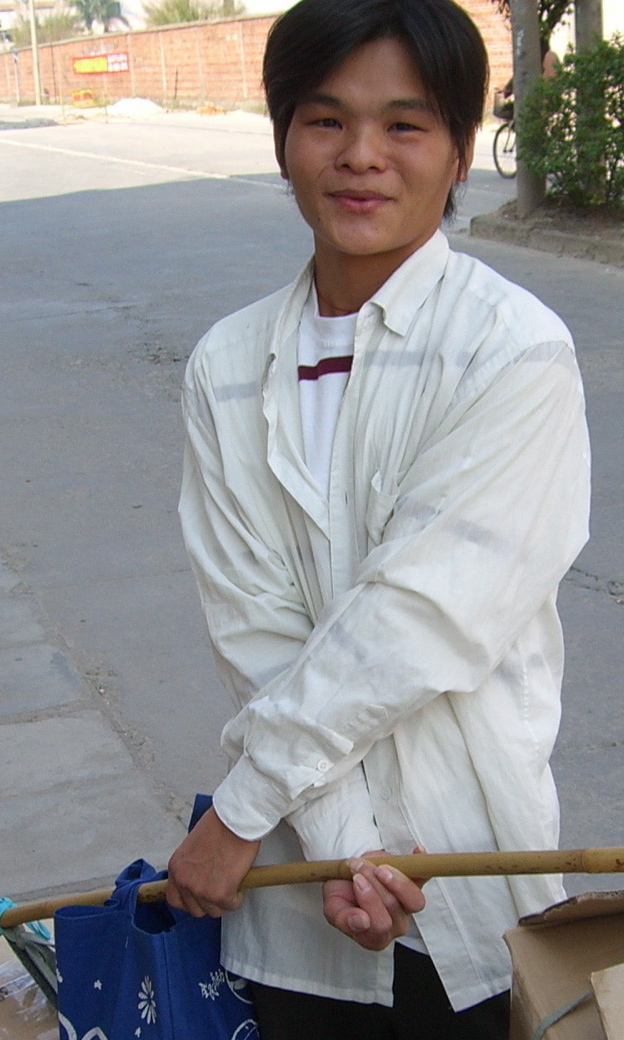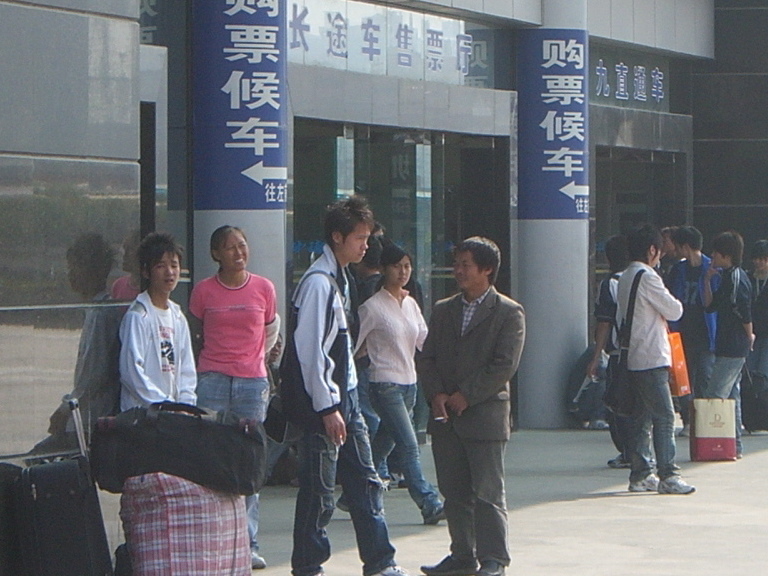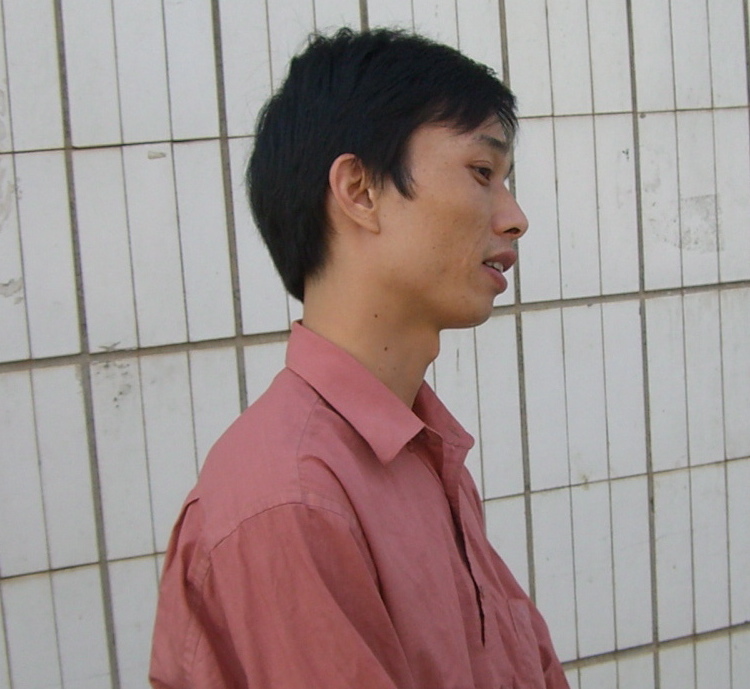
DONGGUAN, China - Spend a few hours at the Dongguan Railway Station and the mass exodus of migrant workers leaving this dusty Pearl River Delta manufacturing hub looks more like a slow trickle. They come alone or in small groups with what possessions they can carry, wrapped in the ever-present industrial red-white-and-blue packaging strewn about China, stuffed in plastic grocery sacks, or rolled in bundles. A few hundred a day come through the railway station to return home to provinces like Sichuan, Guangxi, Hunan, Hubei and Guizhou - provinces they had left in the last few years to seek higher paying jobs in Guangdong province, aka "the factory of the world." Now many of those factories are closing and laying people off because of a massive drop in exports. Some workers are also quitting because the basic pay is too low. They leave much like they came, with few possessions and little money saved. All they have really earned here are the lines on their faces, the blisters on their puffy, calloused hands and the uncertain futures that await them in their hometowns.
Estimates are that up to 2.5 million workers could lose their jobs in Guangdong's factories by the time the Chinese Lunar New Year comes in late January - about 1 million of those in Dongguan alone. Many have already returned to the homes of their parents, adding another mouth to feed to the family table while trying to figure out their next move. Most of them, like Mr. Xu, a 35-year-old from Changsha in Hunan province, said they've never seen it this bad. For the last three years he's worked at the Fuyang Knitwear Mill making sweaters. Half of the 300 workers at his factory have lost their jobs this year. "If I can find a job in Hunan, I won't come back," said Xu. "But it's hard to find a job like this there, so I'll probably return to Dongguan after the Lunar New Year."
It was a common refrain among the nearly two dozen workers interviewed in Dongguan and Guangzhou last week - "I'll come back after the Lunar New Year to find a job if I can't find one at home." Nearly everyone mentioned this. But rumors are that many companies might try to hold on until the winter holiday and declare bankruptcy just afterward, meaning most of these workers will find nothing left in Dongguan if they do decide to return.
Near the top of the escalator two sisters lean against the railing that overlooks the railway station lobby. Deng Lina, 23, and Deng Lixiang, 19, are surrounded by bags and waiting for the train that will take them back to their hometown of Zhengzhou in Henan province. The older sister quit her job several days ago at a furniture factory. In the past few months orders have been so low that one day of work has been followed by several days of inactivity. Because most of the workers in Dongguan only get a basic salary of around 770 yuan a month ($112), they try to make the job worthwhile by working overtime to boost their salaries up to about 1,000 yuan a month. Now, since there are so few orders at the factories, many are quitting because there is no overtime available. "I've worked there two years and this is the worst I've seen," said Lina. "It's very hard for the factory to survive. I understand. I don't blame anyone there." Her younger sister Lixiang worked at Dongli Electronics Ltd. until being laid off a few days ago. The factory used to employ up to 10,000 workers, but now has only 2,000. They said they'll attempt to find jobs back home, but since their family is very poor and unable to support them, they'll try to return to Dongguan in a few months.
Deng Ye, a girl in her early 20s, is going back to Enshi in Hubei province. She had worked for a year in Dongguan, but was one of the 1,000 people to lose their jobs at a factory that previously employed 3,000. In September and October, an estimated 300,000 unemployed migrant workers returned to Hubei, according to labor and social security officials there. More like Deng are on their way. "The basic salary is too low and since there are no orders we can't work overtime," said Deng. "Every company is the same. People are earning less this year than last year."
In Deng's case, her actual basic salary only came out to 470 yuan per month because the factory took out 300 yuan for food and dormitory costs, making it even more difficult for her to save any money. Other factories have similar fees. At Delta Electronics Co. where Ms. Qin from Yiyang in Hunan province works, 50 yuan is taken out per month for a room she shares with seven other women. The factory recently lost three-fourths of its workforce. "Usually we could earn about 1,300 yuan a month by working overtime, but now it's only 900 yuan," said Qin. "There were no more orders. It's not the factory's fault. Many factories near mine are facing bankruptcy."
It's a warm, sleepy late November afternoon in the Dapu Industrial District of Dongguan. Just the night before, about an hour's bus ride across town in the Zhongtang District, workers rioted at a toy factory, dissatisfied with their compensation for being laid off. Dongguan, with an official population of around 7.5 million, is a sprawling mass of factories, dormitories and apartments. Nearly all of its business is tied to the products it produces for export or to the workers it caters to. The workers in Dapu hadn't heard about the disturbances on the other side of town, but most were reluctant to give their names because they were still working and didn't want problems with their bosses.
It's the middle of the day but there are many small groups of workers from different factories milling about, a testimony to the lack of orders in their shops. A majority of those walking around are women. Everyone says the orders are low and because of this most have no overtime work. A group of four women in blue smocks say their factory had 4,000 workers earlier this year and now only has 1,000. Two young men in their early 20s, chomping on reeds of sugarcane, say that most of their friends have left for home and that it's harder for men to find work because the factories prefer girls -- they cause less trouble.

Coming down the street is a young man with two boxes lashed to a bamboo pole slung across his shoulders. In his hand is a bucket with a thermos and few items of food. He says he's from Bobai in Guangxi province and doesn't give his name. Just the day before he'd lost his job, and the factory still owed him two months in back pay that he says he'll probably never see. Most days he worked from 8 in the morning until midnight in order to try to get more overtime pay to boost his 770 yuan monthly salary. "I'll go to a friend's place to stay now and look for a new job," he said. "If I can't find a job here I'll go back to Bobai. I have two children, so there's a lot of pressure."
It's not uncommon in China for migrant workers to be paid a month, or even several months, late. One couple, along with their friend (another Mr. Xu), say their main problem is getting paid on time. "Sometimes there is a delay of up to three months," says the girl. The three of them are all from Yuning in Guangxi and work for the Dongguan Weilun Knitting Co., a company that exports mainly to the U.S., Japan, and Europe. "We have a big order at the moment, so most of us can work overtime," said the couple, indicating that overtime means working from 8 am to midnight.
"What's the minimum wage in America?" their friend Mr. Xu asks. A look of shock appears on his face when he hears the federal minimum wage is $6.55 per hour. He doesn't seem to understand the differences in the cost of living. "You are so rich in America! We need you to buy our products. Why aren't you buying anything?"
Chen Donghai, 28, manages the Mei Run Restaurant just up the road where around 20 of these factories are located. His inexpensive Hunan cuisine is a favorite among the workers and there are other branches throughout the city serving the same, now dwindling clientele. "All of our restaurants are in the same situation," said Chen. "Our turnover has dropped by more than a half. Usually we would turn over about 1,000 yuan worth of food during the week and 2,500 to 3,000 a day on the weekend. Now it's hard to make 500 to 700 a day during the week." Chen, who comes from Yuning in Guangxi province has had to let six of his workers go and now only has four. "We're all from the same place, so we help them find new jobs here or back home."
Nearby at the Wang Xiang Hunan Restaurant, the story is the same. The manager of this independent eatery, Wang Hui, says his profits have dropped by half in the past few months and he has had to reduce his staff from eight to four. He also said his turnover is about 500 to 700 yuan per day during the week. "It is very hard for us to operate now," he said. "Nowadays all the restaurants around here are the same. We have no way to make a living."
At the central railway station in Guangzhou, the provincial capital of Guangdong, the numbers of migrant workers leaving is more difficult to detect. This is largely because there isn't as much manufacturing in Guangzhou proper, and the city is more prosperous than its surrounding factory towns. Still, if you look close enough, you will see the same faces that you see in Dongguan. Off to the side, under a row of trees, a line of men sit in the shade waiting for the train that will take them back home. A cleaning woman brandishing a grass broom starts sweeping over the feet and legs of the workers, forcing them out of the way.
One of them is Han Youquan, a 35-year-old native from Chongqing in Sichuan province. With a shy grin, he moves out of the way to let the woman do her job and explains that he lost his job at an electronics factory that has shed 80 of its 200 workers because of the economic downturn. "Other factories around us are the same," Han said. "The economy is not good now." Han also hopes to come back if he can't find a job in Hubei where his wife and her parents live. He doesn't have any children, but has to work to support his parents. "We're too poor to have a child now," he says. "Maybe when things get better for us."
Toward the entrance of the station a young couple in their early 20s wait in the baking sun. They didn't want to give their names, but did say they worked at the Guangdong Tongyuan Shoe Factory in Guangzhou, where half of the 600 people there have already left. The boy is from Shanxi province, the girl from Sichuan, so they have to go their separate ways for now, though like everyone else they say they'll come back in a few months. "I'm angry because the factory owes us money," says the boy. "We didn't get paid for the last two months of work. The government should call on the factories to protect the workers' rights."
Inside the station, crouching on the floor, 21-year-old Lan Riliang clutches his ticket home. He turns it over and over in his hand studying it like some strange artifact. With only a middle school education, like so many of the migrant workers, there's not much he can do other than manual labor back in his hometown of Guigang in Guangxi province or the type of jobs Dongguan had supported until recently. Three months ago he was brought from Guigang to Guangzhou with a group of around 20 people to work on a project for a water company. After three months of work, all of them were let go without pay. "We don't know who to ask for the money," he said. "I'm angry because they told us we'd be paid well, but when we came here they only gave us some money for food and rent, but no salary. I don't know what I'll do now."



